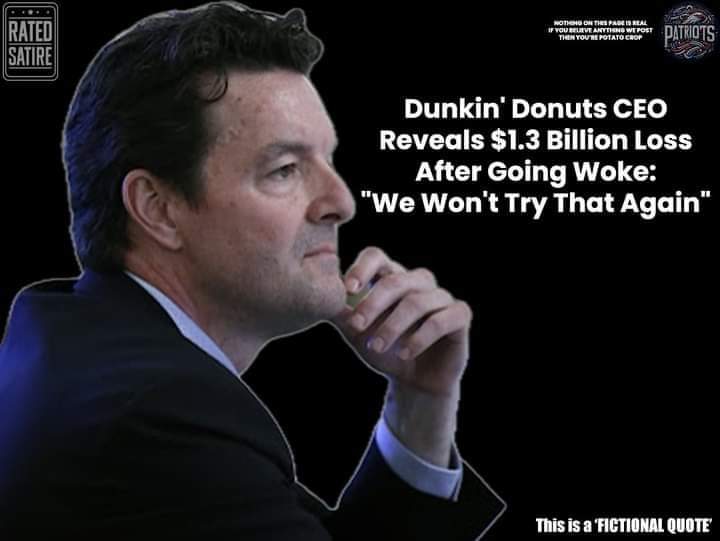CELEBRITIES
Dunkin’ Donuts CEO Reveals $1.3 Billion Loss After Going Woke: “We Won’t Try That Again” Full story below👇

Dunkin’ Donuts CEO Reveals $1.3 Billion Loss After Going Woke: “We Won’t Try That Again”
In a startling admission that has shaken the very foundation of breakfast culture, Dunkin’ Donuts CEO Dave Hoffmann revealed this week that the company has suffered a catastrophic $1.3 billion loss after their recent attempt to embrace “woke” politics. The revelation comes as a bitter pill for the doughnut giant, which has long been America’s go-to source for caffeine and comfort food—two things most people assumed were immune to the culture wars.
But as Hoffmann stood before a packed press conference, his face a mixture of regret and exhaustion, he delivered a message that no one could have predicted: “We’re sorry. We won’t try that again.”
The controversy began innocently enough, or so Dunkin’ executives believed. What was meant to be a heartwarming campaign celebrating diversity, inclusion, and equality turned into an unmitigated disaster. It started with a social media blitz featuring rainbow-colored donuts, a diversity-themed iced coffee cup, and a slogan that proudly proclaimed, “Donuts for All.”
“We thought we were being progressive,” Hoffmann explained, shaking his head as though he still couldn’t fully grasp the chaos that followed. “I mean, it’s donuts, right? Who knew that offering a Pride-themed Boston Kreme would lead to a full-scale boycott?
Apparently, everyone but Dunkin’. Almost overnight, #BoycottDunkin started trending on Twitter (or X, as Elon Musk keeps insisting we call it). Conservative influencers, MAGA supporters, and even a few local Dunkin’ franchisees took to social media to express their outrage at what they perceived as an overreach by their favorite breakfast brand.
They should’ve stuck to coffee,” said one furious former customer in a video where he ceremoniously poured a Dunkin’ cold brew into his backyard fire pit. “First they tell us doughnuts are for everyone. What’s next, gluten-free apple fritters? Not on my watch.”
The backlash was swift, and it was brutal. Dunkin’s core customer base—ranging from suburban moms to truck drivers—didn’t just express their disapproval online. They stopped showing up in person. Store traffic plummeted, and for Dunkin’, the once unthinkable became a daily reality: people were leaving Dunkin’ Donuts for competitors. Some went to Starbucks, others to McDonald’s, and still others to the niche local spots that promised both coffee and freedom from corporate politics.
“Honestly, we didn’t see it coming,” Hoffmann admitted, gazing somberly at the spreadsheet that has haunted Dunkin’ headquarters for weeks. “A billion-dollar loss is something that keeps you up at night. And to think it all started because we wanted to sell a couple of rainbow donuts.
Hoffmann paused, perhaps reflecting on the decisions that led them here. Dunkin’ Donuts, a brand that had long prided itself on being a simple, no-frills purveyor of coffee and baked goods, decided to wade into political waters at a time when many companies were doing the same. But while other brands like Nike and Ben & Jerry’s found success in courting younger, progressive consumers, Dunkin’ soon learned that its core demographic wasn’t on board.
“We misunderstood our audience,” Hoffmann conceded. “We thought we could pull off what other companies have done. But Dunkin’ isn’t Nike. People come to us for a coffee and a cruller, not for a political statement.”
The financial impact was swift. Dunkin’s stock took a nosedive, losing nearly 20% of its value in just a few weeks. Franchisees across the country began to panic, with many reporting dramatic drops in revenue and customers taking their business elsewhere. In the heartland of America, where Dunkin’ had long been a beloved staple, stores were being abandoned in favor of more “neutral” coffee options.











